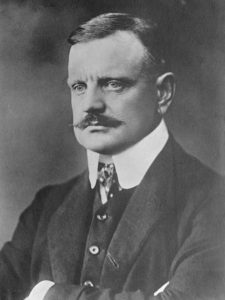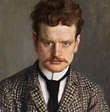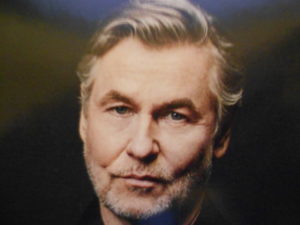Davies Symphony Hall, San Francisco, June 8, 2025 Sibelius and Salonen made a great combination. Esa-Pekka Salonen conducted Jean Sibelius’ Symphony No. 7 in C Major, Opus 105. It was Sibelius’ last symphony; he lived until 1957, but no longer composed symphonies. He had said what he wanted to say. Except one more great tone poem, Tapiola, he stopped. He had done it. The 7th Symphony is a strange and powerful voice. After listening to it, what came to my mind was love. Love in the broadest, most extensive, personal and universal reality added up to that. It was a unified love of which we are a part.
 Jean Sibelius, composer (1865 – 1957) born and lived in Finland
Jean Sibelius, composer (1865 – 1957) born and lived in Finland
Some time ago, Michael Steinberg, the glorious author of program notes, told me that Sibelius’ No. 7 was the great symphony of the 20th century, even though it was composed in 1924, very early for a century of music. This performance was my first time hearing it. When the music ended and the applause for the orchestra, the conductor, and especially the composer, I wanted them to play it all again. It is not an overwhelming, knock you out symphony. It opens with a quiet drum. Its music seems down to earth at the same time it is mysterious. Perhaps the mystery wraps around the down-to-earth part. Sibelius made plans for his final three symphonies beginning in spring of 1918. These symphonies form and continual thought through each one and all. That means that the 5th Symphony began this thought and breath that relates all three. In 1918, he wrote: “The Seventh Symphony. Joy of life, and vitalite with appassionata passages. In three movements-the last a ‘Hellenic Rondo.'” Quoting M. Steinberg, “intensely, frighteningly appassionata music, though not in any sense wild….a musical gesture that should leave a witness bereft of speech and to which one responds with concert-hall applause only in order not to explode.” At the end of the performance of the 7th, that was truly how I felt. Ka-boom!
 Although he had planned on 3 movements, this symphony was one movement with different tempi changing without the listener noticing the change until after it happens. The time of the symphony constructs and moves on; Sibelius writes through and about Time. It surrounds us and it is us. That mystery we heard at the beginning became an all covering, all happening effect of our world. The beauty of this symphony is frightening and it is us. The love is bigger than one notices from moment to moment, here, down-to-earth, in sight and sound and time. Yes, please play it again.
Although he had planned on 3 movements, this symphony was one movement with different tempi changing without the listener noticing the change until after it happens. The time of the symphony constructs and moves on; Sibelius writes through and about Time. It surrounds us and it is us. That mystery we heard at the beginning became an all covering, all happening effect of our world. The beauty of this symphony is frightening and it is us. The love is bigger than one notices from moment to moment, here, down-to-earth, in sight and sound and time. Yes, please play it again.
 Richard Strauss, composer (1864 – 1949) Germany/West Germany
Richard Strauss, composer (1864 – 1949) Germany/West Germany
New ways to compose came from early 19th century by Schubert, Liszt, and into the 20th with Richard Strauss. Strauss’ symphonic poems were in that tradition. He may have been inspired by Sibelius’ works. The concert opened with Strauss’ Don Juan, Opus 20; it was composed in 1888-1889. The music is not at all shy about hearing the adventures and disasters of Don Juan in the symphonic poem. Then, continuing the symphonic poem tradition, the program ended with Strauss’ Till Eulenspiegel’s Merry Pranks, Opus 28. I have a memory of this music from 5th grade. The “music lady” came to Maryland Elementary School and played Till Eulenspiegel and later The Moldau, by Bedrich Smetana. She told the class the story of Till the naughty things he did and then the end when he is hanged. It is hard to like this story though the music is very vivid. She wanted us to see the story in the music; I did not want to see that. However, I have always loved The Moldau.
 The orchestra played with power and grace. It was their Music Director’s second to last concert. He will lead the SF Symphony and the SF Symphony Chorus, Thursday through Saturday, this week playing Mahler Symphony No. 2. I felt fresh energy from the musicians, and I felt that Maestro Salonen was more relaxed in his directing but also in his own physical movements. The music was simultaneously in his own body as he conducted his orchestra. It is hard to say “good bye” to the Music Director. He made his mark in such a short time, 5 years, and much of that time was taken up with the pandemic. His performances have been memorable, and these recent programs, The Firebird and Sibelius’ Symphony No. 7 will stay in my mind played his way.
The orchestra played with power and grace. It was their Music Director’s second to last concert. He will lead the SF Symphony and the SF Symphony Chorus, Thursday through Saturday, this week playing Mahler Symphony No. 2. I felt fresh energy from the musicians, and I felt that Maestro Salonen was more relaxed in his directing but also in his own physical movements. The music was simultaneously in his own body as he conducted his orchestra. It is hard to say “good bye” to the Music Director. He made his mark in such a short time, 5 years, and much of that time was taken up with the pandemic. His performances have been memorable, and these recent programs, The Firebird and Sibelius’ Symphony No. 7 will stay in my mind played his way.